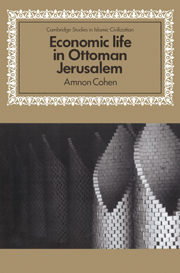Book contents
- Frontmatter
- Contents
- List of illustrations
- Note on transcription
- Map1
- Introduction
- 1 Butchers and meat consumption
- 2 Soap production and olive oil
- 3 Flour and bread
- Conclusion
- Note on abbreviations
- Note on weights, measures and monetary values
- Appendix 1 Meat prices in Jerusalem
- Appendix 2 Olive oil and soap prices in Jerusalem
- Appendix 3 Flour and bread prices in Jerusalem
- Appendix 4 A soap-factory in Jerusalem
- Notes
- Bibliography
- Subject index
- Geographical index
- Index of personal names
1 - Butchers and meat consumption
Published online by Cambridge University Press: 10 November 2010
- Frontmatter
- Contents
- List of illustrations
- Note on transcription
- Map1
- Introduction
- 1 Butchers and meat consumption
- 2 Soap production and olive oil
- 3 Flour and bread
- Conclusion
- Note on abbreviations
- Note on weights, measures and monetary values
- Appendix 1 Meat prices in Jerusalem
- Appendix 2 Olive oil and soap prices in Jerusalem
- Appendix 3 Flour and bread prices in Jerusalem
- Appendix 4 A soap-factory in Jerusalem
- Notes
- Bibliography
- Subject index
- Geographical index
- Index of personal names
Summary
[…] “Swine is good Saxon […] but how call you the sow when she is flayed, and drawn and quartered, and hung up by the heels like a traitor?” “Pork”, answered the swine-herd, “I am very glad every fool knows that too”, said Wamba, “and pork, I think, is good Norman-French, and so when the brute lives […] she goes by her Saxon name; but becomes a Norman and is called pork, when she is carried to the Castle-hall to feast among the nobles” […] “there is old Alderman Ox continues to hold his Saxon epithet, while he is under the charge of serfs […] but becomes Beef, a fiery French gallant, when he arrives before the worshipful jaws that are destined to consume him. Mynheer Calf, too, becomes Monsieur de Veau in the like manner he is Saxon when he requires tenance, and takes a Norman name, when he becomes a matter of enjoyment.
Ivanhoe, Sir Walter Scott, Chapter 1.The muḥtasib and the butcher
The office of ḥisba, although not mentioned in the Koran or in any of the other canonical texts of Islam, is one of the oldest institutions of the Islamic state. Opinions may vary as to whether the muḥtasib which was entrusted with it was actually a revised version of an earlier Greek institution or an authentic Arab term that emerged in the new socio-political reality of the ʿAbbasid empire.
- Type
- Chapter
- Information
- Economic Life in Ottoman Jerusalem , pp. 11 - 60Publisher: Cambridge University PressPrint publication year: 1989

